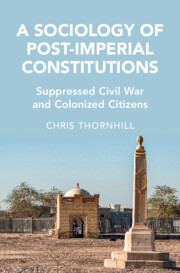Book contents
- A Sociology of Post-Imperial Constitutions
- Cambridge Studies in Law and Society
- A Sociology of Post-Imperial Constitutions
- Copyright page
- Dedication
- Contents
- Acknowledgements
- Introduction
- Chapter One Imperialism and the Origins of Constitutions
- Chapter Two Constitutions and the Persistence of Empires
- Chapter Three Imperialism and Global Civil War
- Chapter Four Imperial Nations in Latin America
- Chapter Five Military Constitutions in and after the Ottoman Empire
- Chapter Six World Law and Occupation Constitutions
- Chapter Seven The Occupation Constitution II
- Chapter Eight The Occupation Constitution III
- Chapter Nine Constitutions after War
- Chapter Ten New Security Constitutions
- Conclusion
- Bibliography
- Index
- Cambridge Studies in Law and Society
Chapter Nine - Constitutions after War
Published online by Cambridge University Press: 06 December 2024
- A Sociology of Post-Imperial Constitutions
- Cambridge Studies in Law and Society
- A Sociology of Post-Imperial Constitutions
- Copyright page
- Dedication
- Contents
- Acknowledgements
- Introduction
- Chapter One Imperialism and the Origins of Constitutions
- Chapter Two Constitutions and the Persistence of Empires
- Chapter Three Imperialism and Global Civil War
- Chapter Four Imperial Nations in Latin America
- Chapter Five Military Constitutions in and after the Ottoman Empire
- Chapter Six World Law and Occupation Constitutions
- Chapter Seven The Occupation Constitution II
- Chapter Eight The Occupation Constitution III
- Chapter Nine Constitutions after War
- Chapter Ten New Security Constitutions
- Conclusion
- Bibliography
- Index
- Cambridge Studies in Law and Society
Summary
This chapter begins an analysis of why some constitutional systems have begun again to show militaristic emphases. It argues that in some cases this is to due to the fact that, since the 1980s, one part of the system of world law constructed after 1945 – namely the internal welfare dimension – has been weakened. This is assessed as part of the global background in constitution-making processes that commenced in the 1980s. The chapter considers a range of cases where constitutions have begun to malfunction with military consequences. It divides these cases into constitutions marked by vertical militarization (Russia, Brazil) and constitutions marked by lateral militarization. It links these developments to weakness in social integration processes under different constitutions.
- Type
- Chapter
- Information
- A Sociology of Post-Imperial ConstitutionsSuppressed Civil War and Colonized Citizens, pp. 438 - 472Publisher: Cambridge University PressPrint publication year: 2024

